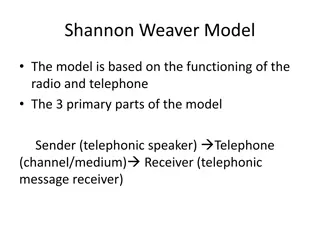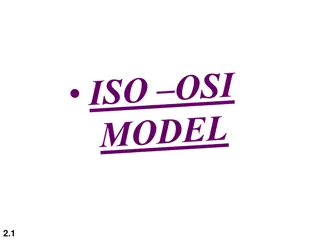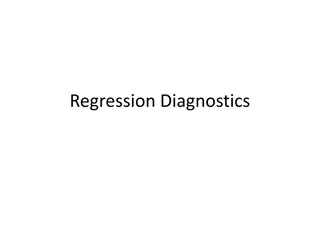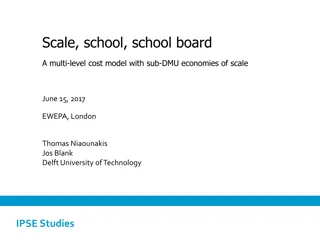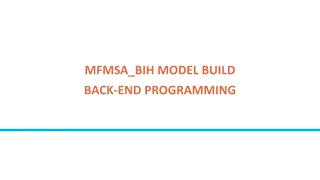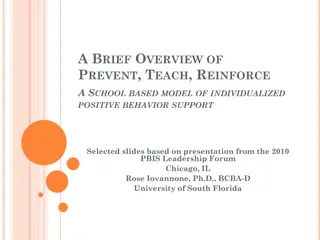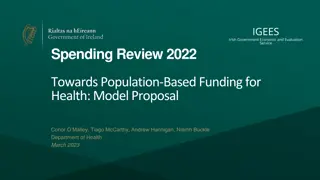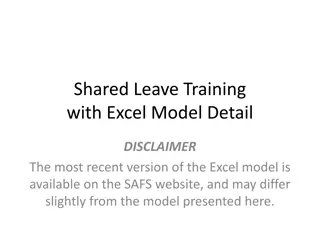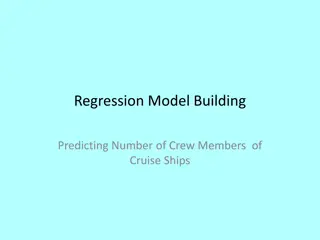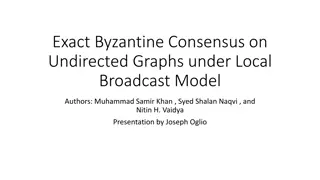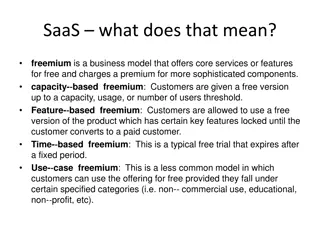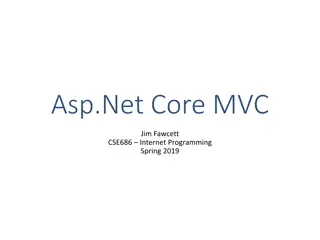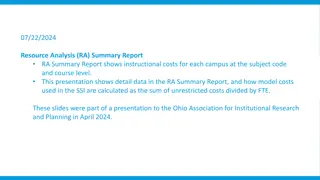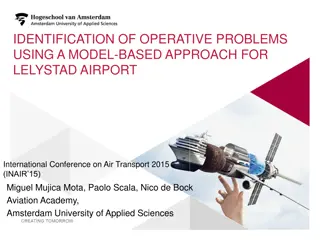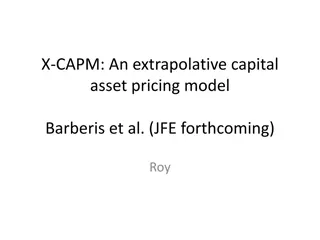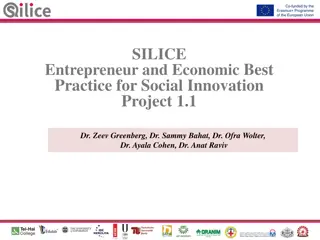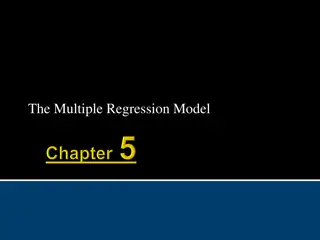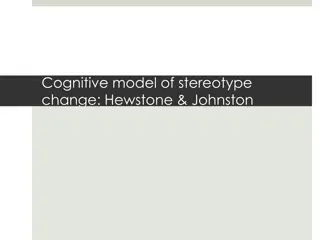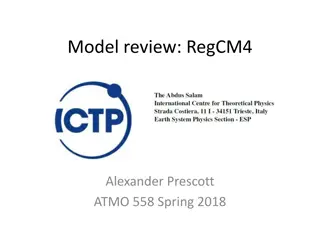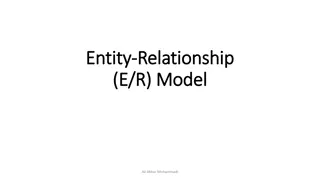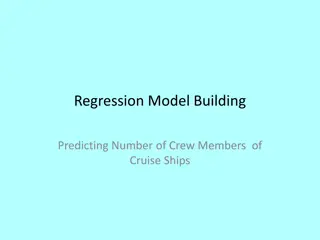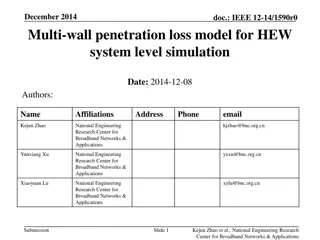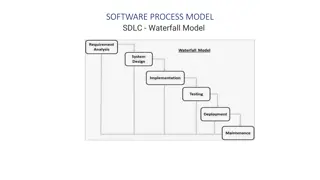Building a Macrostructural Standalone Model for North Macedonia: Model Overview and Features
This project focuses on building a macrostructural standalone model for the economy of North Macedonia. The model layout includes a system overview, theory, functional forms, and features of the MFMSA_MKD. It covers various aspects such as the National Income Account, Fiscal Account, External Accoun
2 views • 23 slides
NAMI Family Support Group Model Overview
This content provides an insightful introduction to the NAMI family support group model, emphasizing the importance of having a structured model to guide facilitators and participants in achieving successful support group interactions. It highlights the need for a model to prevent negative group dyn
6 views • 23 slides
Understanding Emotionally Based School Avoidance in Children and Young People
Emotionally Based School Avoidance (ESBA) is a common issue among children and young people, leading to school attendance concerns. This article sheds light on the diverse presentation of school avoidant behaviors, effective strategies for addressing them, and the prevalence of anxiety and stress as
1 views • 42 slides
Understanding Entity-Relationship Model in Database Systems
This article explores the Entity-Relationship (ER) model in database systems, covering topics like database design, ER model components, entities, attributes, key attributes, composite attributes, and multivalued attributes. The ER model provides a high-level data model to define data elements and r
0 views • 25 slides
Communication Models Overview
The Shannon-Weaver Model is based on the functioning of radio and telephone, with key parts being sender, channel, and receiver. It involves steps like information source, transmitter, channel, receiver, and destination. The model faces technical, semantic, and effectiveness problems. The Linear Mod
0 views • 8 slides
Understanding Atomic Structure: Electrons, Energy Levels, and Historical Models
The atomic model describes how electrons occupy energy levels or shells in an atom. These energy levels have specific capacities for electrons. The electronic structure of an atom is represented by numbers indicating electron distribution. Over time, scientists have developed atomic models based on
0 views • 5 slides
Understanding ROC Curves and Operating Points in Model Evaluation
In this informative content, Geoff Hulten discusses the significance of ROC curves and operating points in model evaluation. It emphasizes the importance of choosing the right model based on the costs of mistakes like in disease screening and spam filtering. The content explains how logistical regre
7 views • 11 slides
Understanding the OSI Model and Layered Tasks in Networking
The content highlights the OSI model and layered tasks in networking, explaining the functions of each layer in the OSI model such as Physical Layer, Data Link Layer, Network Layer, Transport Layer, Session Layer, Presentation Layer, and Application Layer. It also discusses the interaction between l
1 views • 41 slides
Regression Diagnostics for Model Evaluation
Regression diagnostics involve analyzing outlying observations, standardized residuals, model errors, and identifying influential cases to assess the quality of a regression model. This process helps in understanding the accuracy of the model predictions and identifying potential issues that may aff
1 views • 12 slides
Economies of Scale in Dutch Primary Education: A Multi-level Cost Model
This paper explores economies of scale in Dutch primary education, focusing on school boards and school compositions. The study examines the impact of school size variations on cost determination at both levels, considering the challenges of limited input data availability. Different solutions are p
3 views • 16 slides
MFMSA_BIH Model Build Process Overview
This detailed process outlines the steps involved in preparing, building, and debugging a back-end programming model known as MFMSA_BIH. It covers activities such as data preparation, model building, equation estimation, assumption making, model compilation, and front-end adjustment. The iterative p
0 views • 10 slides
School-Based Model of Individualized Positive Behavior Support
A brief overview of the Prevent-Teach-Reinforce (PTR) model presented at the 2010 PBIS Leadership Forum in Chicago, highlighting the 5-step Tier 3 support model, critical components of behavior support, team evaluation, goal setting, and operational definitions of behaviors and replacements. The mod
0 views • 24 slides
Holy Family Community School First Year Information 2020/2021
Holy Family Community School provides education based on Christian values and principles, embracing respect, responsibility, and cooperation. The school, with the trustees including The Spiritan Congregation and Presentation Sisters, aims to foster a community of students, parents, and staff. Transi
0 views • 29 slides
Model Safe School Programme Training in Saint Kitts and Nevis
Welcome to the Model Safe School Programme Training held in Saint Kitts and Nevis from October 9th to 13th, 2017. The agenda includes sessions on school safety, assessment tools, and discussions with school authorities. The training involves visits to Tucker Clarke Primary School, Cecele Browne Inte
0 views • 8 slides
Towards Population-Based Funding for Health: IGEES Spending Review 2022 Model Proposal
The Irish Government Economic and Evaluation Service (IGEES) presents a model proposal for implementing Population-Based Resource Allocation (PBRA) in the healthcare sector. The proposal aims to distribute funding equitably among Regional Health Authorities (RHAs) based on population needs and cost
0 views • 4 slides
Proposal for Radio Controlled Model Aircraft Site Development
To establish a working relationship for the development of a site suitable for radio-controlled model aircraft use, the proposal suggests local land ownership with oversight from a responsible agency. Collins Model Aviators is proposed as the host club, offering site owner liability insurance throug
0 views • 20 slides
Excel Model for Shared Leave Training Detail
The Excel model for shared leave training detail allows school district employees to share leave both within and outside their district. The model facilitates the calculation of hourly salary rates and benefits for employees interested in participating in the shared leave program. The implementation
0 views • 12 slides
UBU Performance Oversight Engagement Framework Overview
Providing an overview of the UBU Logic Model within the UBU Performance Oversight Engagement Framework, this session covers topics such as what a logic model is, best practice principles, getting started, components of the logic model, evidence & monitoring components, and next steps. The framework
0 views • 33 slides
Regression Model for Predicting Crew Size of Cruise Ships
A regression model was built to predict the number of crew members on cruise ships using potential predictor variables such as Age, Tonnage, Passenger Density, Cabins, and Length. The model showed high correlations among predictors, with Passengers and Cabins being particularly problematic. The full
0 views • 16 slides
Exact Byzantine Consensus on Undirected Graphs: Local Broadcast Model
This research focuses on achieving exact Byzantine consensus on undirected graphs under the local broadcast model, where communication is synchronous with known underlying graphs. The model reduces the power of Byzantine nodes and imposes connectivity requirements. The algorithm involves flooding va
0 views • 7 slides
Calibration of Multi-Variable Rainfall-Runoff Model Using Snow Data in Alpine Catchments
Explore the calibration of a conceptual rainfall-runoff model in Alpine catchments, focusing on the importance of incorporating snow data. The study assesses the benefits of using multi-objective approaches and additional datasets for model performance. Various aspects such as snow cover, groundwate
0 views • 16 slides
Understanding Freemium Business Model in SaaS Industry
Freemium business model in the SaaS industry offers core services for free with the option to upgrade for advanced features. Various freemium models include capacity-based, feature-based, time-based, and use-case-based. Pros include extended developer base and early user feedback, while cons involve
0 views • 4 slides
Understanding Asp.Net Core MVC - Building Web Applications with Model-View-Controller Pattern
Asp.Net Core MVC is a framework for building web applications based on the Model-View-Controller pattern. The model manages application data and constraints, views present application state, and controllers handle requests and actions on the data model. Learn about the MVC structure, life cycle, mod
0 views • 22 slides
School Policies and Procedures at Monroe High School
In the student handbook of Monroe High School, policies regarding the use of school phones, bus riders, securing personal items, absences and tardiness are outlined. Students are required to obtain a pass from teachers to use school phones during school hours and must follow a procedure to ride a bu
0 views • 21 slides
Resource Analysis Summary Report for Instructional Costs
This Resource Analysis Summary Report analyzes instructional costs for different campuses based on subject code and course level. It outlines how model costs used in the State Share of Instruction (SSI) are calculated by dividing the sum of unrestricted costs by Full-Time Equivalents (FTE). The repo
0 views • 9 slides
The Amazing Hope School Academy: Empowering Students with Special Needs
The Amazing Hope School Academy (AHSA) is a non-profit Christian school in Apopka providing a nurturing and inclusive learning environment for children with special needs, offering a unique educational approach based on the Glasser Quality School (GQS) model. AHSA focuses on individual success throu
0 views • 39 slides
Model-Based Analysis for Identifying Operative Problems at Lelystad Airport
This research study presented at the International Conference on Air Transport 2015 explores the identification of operative problems at Lelystad Airport using a model-based approach. The study aims to develop a model for assessing the future performance of the airport, addressing challenges, and ob
0 views • 27 slides
Model Safe School Programme Training Schedule in Saint Lucia
The Model Safe School Programme Training in Saint Lucia is scheduled from October 3-6, 2017. It includes sessions on school safety, assessment tools, on-site assessments, school reporting, improvement plans, stakeholder feedback, and more. The training covers a comprehensive agenda aimed at enhancin
0 views • 7 slides
Understanding X-CAPM: An Extrapolative Capital Asset Pricing Model
This paper discusses the X-CAPM model proposed by Barberis et al., which addresses the challenges posed by investors with extrapolative expectations. The model analytically solves a heterogeneous agents consumption-based model, simulates it, and matches various moments. It explores how rational inve
0 views • 23 slides
Innovation and Social Entrepreneurship Initiatives in Higher Education
This project focuses on establishing a leading center for promoting innovation and social entrepreneurship within higher education institutions. It aims to encourage students and staff to develop creative solutions for community challenges, expand social involvement, and foster sustainable positive
0 views • 13 slides
Principles of Econometrics: Multiple Regression Model Overview
Explore the key concepts of the Multiple Regression Model, including model specification, parameter estimation, hypothesis testing, and goodness-of-fit measurements. Assumptions and properties of the model are discussed, highlighting the relationship between variables and the econometric model. Vari
1 views • 31 slides
Enhancing Session-Based Recommendation with Local Invariance Model
Introducing local invariance to Session-Based Recommendation (SBR), the proposed model considers both detailed ordering and high-level session ordering. By explicitly capturing local context information and global sequential patterns, the model outperforms existing methods in predicting the next use
0 views • 19 slides
Cognitive Model of Stereotype Change: Three Models Explored
The Cognitive Model of Stereotype Change, as researched by Hewstone & Johnston, delves into three key models for altering stereotypical beliefs: the bookkeeping model, the conversion model, and the subtyping model. These models suggest strategies such as adding or removing features to shift stereoty
0 views • 58 slides
Understanding Bohr's Model of the Hydrogen Atom
Exploring the significance of Bohr's hydrogen model in physics, this lecture delves into the Bohr radius, the correspondence principle, and the success and limitations of his model. Discover how characteristic X-ray spectra contribute to our understanding of atomic structures, leading to the conclus
0 views • 14 slides
Overview of RegCM4 Model Features
RegCM4 is a community model developed since the 1980s, with over 800 scientists contributing to its advancements. It features a fully compressible, rotating frame of reference and a limited area dynamical core based on the Penn State/NCAR Mesoscale Model 5 (MM5). The model uses hydrostatic and nonhy
0 views • 14 slides
Understanding Entity-Relationship Model in Databases
The Entity-Relationship Model (E/R Model) is a widely used conceptual data model proposed by Peter P. Chen. It provides a high-level description of the database system during the requirements collection stage. Entities represent things of independent existence, each described by a set of attributes.
0 views • 21 slides
Predicting Number of Crew Members on Cruise Ships Using Regression Model
This analysis involves building a regression model to predict the number of crew members on cruise ships. The dataset includes information on 158 cruise ships with potential predictor variables such as age, tonnage, passengers, length, cabins, and passenger density. The full model with 6 predictors
0 views • 15 slides
Understanding Model Bias and Optimization in Machine Learning
Learn about the concepts of model bias, loss on training data, and optimization issues in the context of machine learning. Discover strategies to address model bias, deal with large or small losses, and optimize models effectively to improve performance and accuracy. Gain insights into splitting tra
0 views • 29 slides
Analysis of Multi-Wall Penetration Loss Model for HEW System-Level Simulation
In December 2014, a multi-wall penetration loss model for HEW system-level simulation was proposed by Kejun Zhao, Yunxiang Xu, and Xiaoyuan Lu from the National Engineering Research Center for Broadband Networks & Applications. The model provides more accurate calculations of penetration loss in ind
0 views • 11 slides
Understanding the Waterfall Model in Software Development
The Waterfall Model is a linear-sequential life cycle model for software development. In this model, each phase must be completed before the next can begin, without overlaps. The sequential phases include Requirement Gathering, System Design, Implementation, Integration and Testing, Deployment, and
0 views • 7 slides




